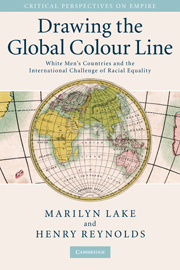 Drawing the Global Colour Line
Drawing the Global Colour Line Book contents
- Frontmatter
- Contents
- Acknowledgments
- Introduction
- Part 1 Modern mobilities
- Part 2 Discursive frameworks
- 2 The American Commonwealth and the ‘negro problem’
- 3 ‘The day will come’: Charles Pearson's disturbing prophecy
- 4 Theodore Roosevelt's re-assertion of racial vigour
- 5 Imperial brotherhood or white? Gandhi in South Africa
- Part 3 Transnational solidarities
- Part 4 Challenge and consolidation
- Part 5 Towards universal human rights
- Index
3 - ‘The day will come’: Charles Pearson's disturbing prophecy
Published online by Cambridge University Press: 05 June 2012
- Frontmatter
- Contents
- Acknowledgments
- Introduction
- Part 1 Modern mobilities
- Part 2 Discursive frameworks
- 2 The American Commonwealth and the ‘negro problem’
- 3 ‘The day will come’: Charles Pearson's disturbing prophecy
- 4 Theodore Roosevelt's re-assertion of racial vigour
- 5 Imperial brotherhood or white? Gandhi in South Africa
- Part 3 Transnational solidarities
- Part 4 Challenge and consolidation
- Part 5 Towards universal human rights
- Index
Summary
The white man ‘elbowed and hustled’ and ‘thrust aside’
In 1892, Charles Pearson had finally finished drafting his magnum opus. He wrote from Melbourne to his friend, James Bryce, in England for advice about a publisher, reassuring him that the book was not solely about Australia: ‘The book would probably have some sale here but our purchasing public is not very large I think. It is to some extent the result of my political experience out here: but the Australian side is not much insisted on’. Bryce put him in touch with his own publishing company, Macmillan, whose books reached a trans-Atlantic as well as an imperial market.
National Life and Character: A Forecast was published in London and New York in 1893 and caused a sensation, most particularly because of its startling prophecy. ‘The day will come’, Pearson wrote, in words that echoed the Chinese Remonstrance to the Victorian parliament and would, in turn, be much quoted:
and perhaps is not far distant, when the European observer will look round to see the globe girdled with a continuous zone of the black and yellow races, no longer too weak for aggression or under tutelage, but independent, or practically so, in government, monopolising the trade of their own regions, and circumscribing the industry of the Europeans … represented by fleets in the European seas, invited to international conferences and welcomed as allies in the quarrels of the civilized world […]
- Type
- Chapter
- Information
- Drawing the Global Colour LineWhite Men's Countries and the International Challenge of Racial Equality, pp. 75 - 94Publisher: Cambridge University PressPrint publication year: 2008
- 1
- Cited by


